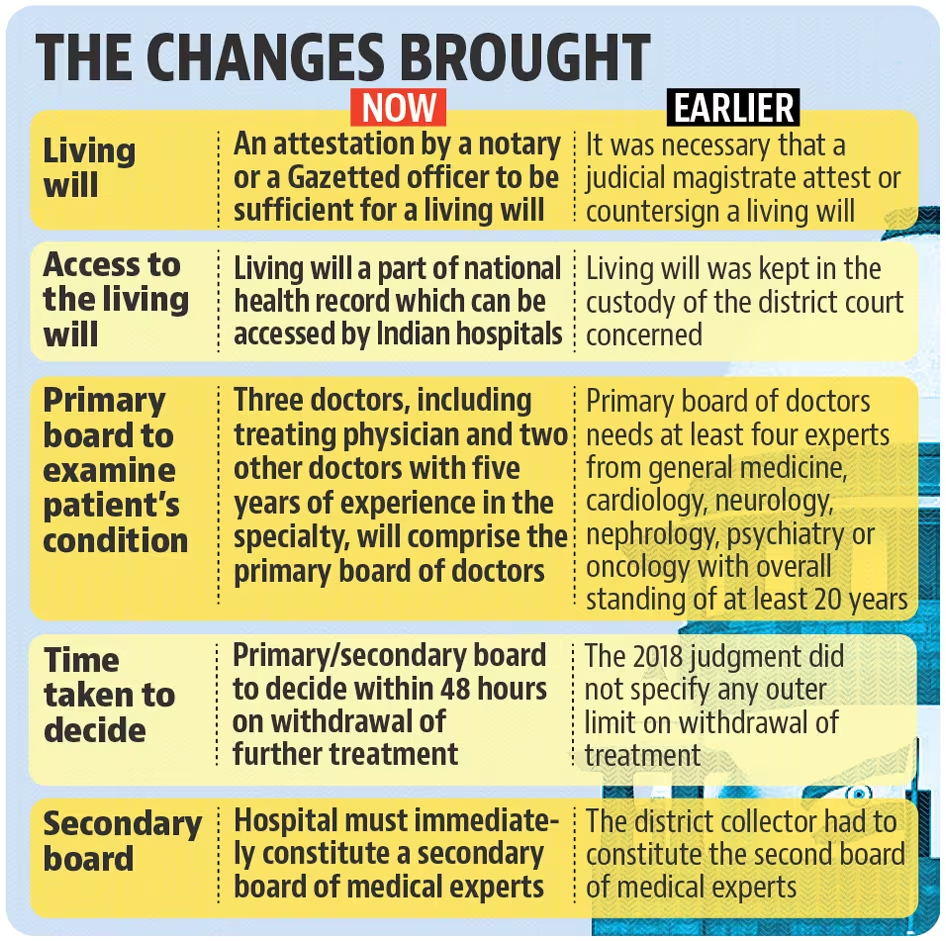ForumIAS announcing GS Foundation Program for UPSC CSE 2025-26 from 19 April. Click Here for more information.
ForumIAS Answer Writing Focus Group (AWFG) for Mains 2024 commencing from 24th June 2024. The Entrance Test for the program will be held on 28th April 2024 at 9 AM. To know more about the program visit: https://forumias.com/blog/awfg2024
Contents
Source: The post is based on the article “Supreme Court eases procedures for terminally ill patients to withdraw medical treatment” published in The Hindu on 4th February 2023.
What is the News?
The Supreme Court has modified its 2018 judgment on passive euthanasia and living wills.
What is a Living Will/advance medical directive(AMD)?
What was the 2018 Supreme Court judgment on living will?
In 2018, the Supreme Court recognised and gave sanction for passive euthanasia and living will/advance directives.
In that judgment, the court had ruled that the right to life under Article 21 includes the right to live with dignity and the same includes the smoothening of the process of dying in case of a terminally ill patient or a person in a persistent vegetative state with no hope of recovery.
The court had laid down guidelines for ‘living will’ made by terminally ill patients who beforehand know about their chances of slipping into a permanent vegetative state.
But these guidelines were challenged in the court on the ground that they were not implementable. The Supreme Court then agreed to modify its guidelines.
What are the modified guidelines issued by the Supreme Court on Living will/advance medical directive(AMD)?

The Supreme Court has modified the previous judgement to do away with the necessity of a judicial magistrate to attest or countersign a living will.
The SC said that the document will be a part of the National Health Digital Records.
At the time of its implementation, that is when the executor/person is terminally ill with no hope of cure, the treating doctor at the hospital would ascertain the genuineness of the living will, compare it with the copy in the digital health records, consult with the relatives about the option that withdrawal of care would be the “best choice”.
The hospital would then form a primary medical board with the treating doctor and two specialists who would verify the condition of the patient within 48 hours.
Then a secondary medical board would be constituted with the Chief Medical Officer of the district nominating the members. This board would again re-ascertain the patient’s condition within 48 hours and give its findings on whether or not to withdraw medical care or life support.
The hospital would then have to convey the findings of both the primary and secondary boards along with the consent of the relatives to the Judicial Magistrate before giving effect to the living will.
In case, the boards refuse to give effect to the living will, the person named in it or the treating doctor or the hospital could approach the High Court concerned. The Chief Justice of the High Court can set up an independent committee of expert medical doctors.
What happens when there is no living will?
In such cases, the treating doctor could inform the hospital, which would constitute a primary medical board.
The board would meet with the patient’s family or next friend or guardian and discuss consent. The meeting should be recorded in writing. Then the same course of action will follow.




